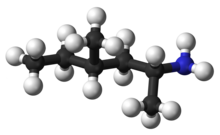 | |
 | |
| Clinical data | |
|---|---|
| Other names | Methylhexaneamine, methylhexamine, geranamine, geranium extract, geranium oil, 2-amino-4-methylhexane, dimethylamylamine, DMAA, 1,3-dimethylamylamine, 1,3-DMAA, 1,3-dimethylpentylamine, 4-methyl-2-hexanamine, 4-methyl-2-hexylamine |
| Routes of administration | Nasal spray, oral |
| ATC code |
|
| Legal status | |
| Legal status | |
| Pharmacokinetic data | |
| Elimination half-life | ~8.5 hours |
| Identifiers | |
| |
| CAS Number | |
| PubChem CID | |
| ChemSpider | |
| UNII | |
| CompTox Dashboard (EPA) | |
| ECHA InfoCard | 100.002.997 |
| Chemical and physical data | |
| Formula | C7H17N |
| Molar mass | 115.220 g·mol−1 |
| 3D model (JSmol) | |
| |
| |
| | |
Methylhexanamine (also known as methylhexamine, 1,3-dimethylamylamine, 1,3-DMAA, dimethylamylamine, and DMAA; trade names Forthane and Geranamine) is an indirect sympathomimetic drug invented and developed by Eli Lilly and Company and marketed as an inhaled nasal decongestant from 1948 until it was voluntarily withdrawn from the market in the 1980s.[8]
Since 2006 methylhexanamine has been sold extensively under many names as a stimulant or energy-boosting dietary supplement under the claim that it is similar to certain compounds found in geraniums, but its safety has been questioned as a number of adverse events and at least five deaths have been associated with methylhexanamine-containing supplements.[9] It is banned by many sports authorities and governmental agencies. Despite multiple warning letters from the FDA,[10] as of 2019, the stimulant remains available in sports and weight loss supplements in the US.[11]
- ^ "DMAA: A prohibited stimulant". United States Department of Defense: Operation Supplement Safety. U.S. Department of Defense. October 12, 2022. Retrieved August 28, 2023.
- ^ "DMAA in Products Marketed as Dietary Supplements". United States Food and Drug Admistration. February 22, 2023. Retrieved August 28, 2023.
[Methylhexanamine] is not a dietary ingredient, and [Methylhexanamine]-containing products marketed as dietary supplements are illegal and their marketing violates the law.
- ^ "United States v. Hi-Tech Pharmaceuticals, Inc., No. 17-13376 (11th Cir. 2019)". Justia Law. August 30, 2019. Retrieved 2023-08-29.
DMAA is not an 'herb or other botanical.' It is not a 'constituent' of an herb or other botanical. And it is not generally recognized by qualified experts, as adequately shown through scientific procedures, to be safe under the conditions of its intended use.
- ^ Meyer, Harry (November 9, 1983). "E. R. Squibb & Sons, inc. et al.; Withdrawal of Approval of New Drug Applications" (PDF). Federal Register. U.S. Food and Drug Administration through the United States Government Publishing Office.
- ^ Care, scheme=AGLSTERMS AglsAgent; corporateName=Health and Aged (2024-09-30), Therapeutic Goods (Poisons Standard—October 2024) Instrument 2024, scheme=AGLSTERMS.AglsAgent; corporateName=Office Parliamentary Counsel; address=Locked Bag 30 Kingston ACT 2604; contact=+61 2 6120 1400, retrieved 2024-10-31
{{citation}}: CS1 maint: multiple names: authors list (link) - ^ Anvisa (2023-07-24). "RDC Nº 804 - Listas de Substâncias Entorpecentes, Psicotrópicas, Precursoras e Outras sob Controle Especial" [Collegiate Board Resolution No. 804 - Lists of Narcotic, Psychotropic, Precursor, and Other Substances under Special Control] (in Brazilian Portuguese). Diário Oficial da União (published 2023-07-25). Archived from the original on 2023-08-27. Retrieved 2023-08-27.
- ^ "1,3-Dimethylpentylamine - Compound Summary". PubChem Compound. USA: National Center for Biotechnology Information. 26 March 2005. Identification and Related Records. Retrieved 27 May 2012.
- ^ Cohen PA (July 2012). "DMAA as a dietary supplement ingredient". Archives of Internal Medicine. 172 (13): 1038–1039. doi:10.1001/archinternmed.2012.1677. PMID 22566490.
- ^ Cite error: The named reference
nyt-fdawas invoked but never defined (see the help page). - ^ "Products & Ingredients - DMAA in Products Marketed as Dietary Supplements". Center for Food Safety and Applied Nutrition (CFSAN). U.S Food and Drug Administratio. May 2019.
- ^ Cohen PA, Wen A, Gerona R (December 2018). "Prohibited Stimulants in Dietary Supplements After Enforcement Action by the US Food and Drug Administration". JAMA Internal Medicine. 178 (12): 1721–1723. doi:10.1001/jamainternmed.2018.4846. PMC 6583602. PMID 30422217.
Cite error: There are <ref group=note> tags on this page, but the references will not show without a {{reflist|group=note}} template (see the help page).